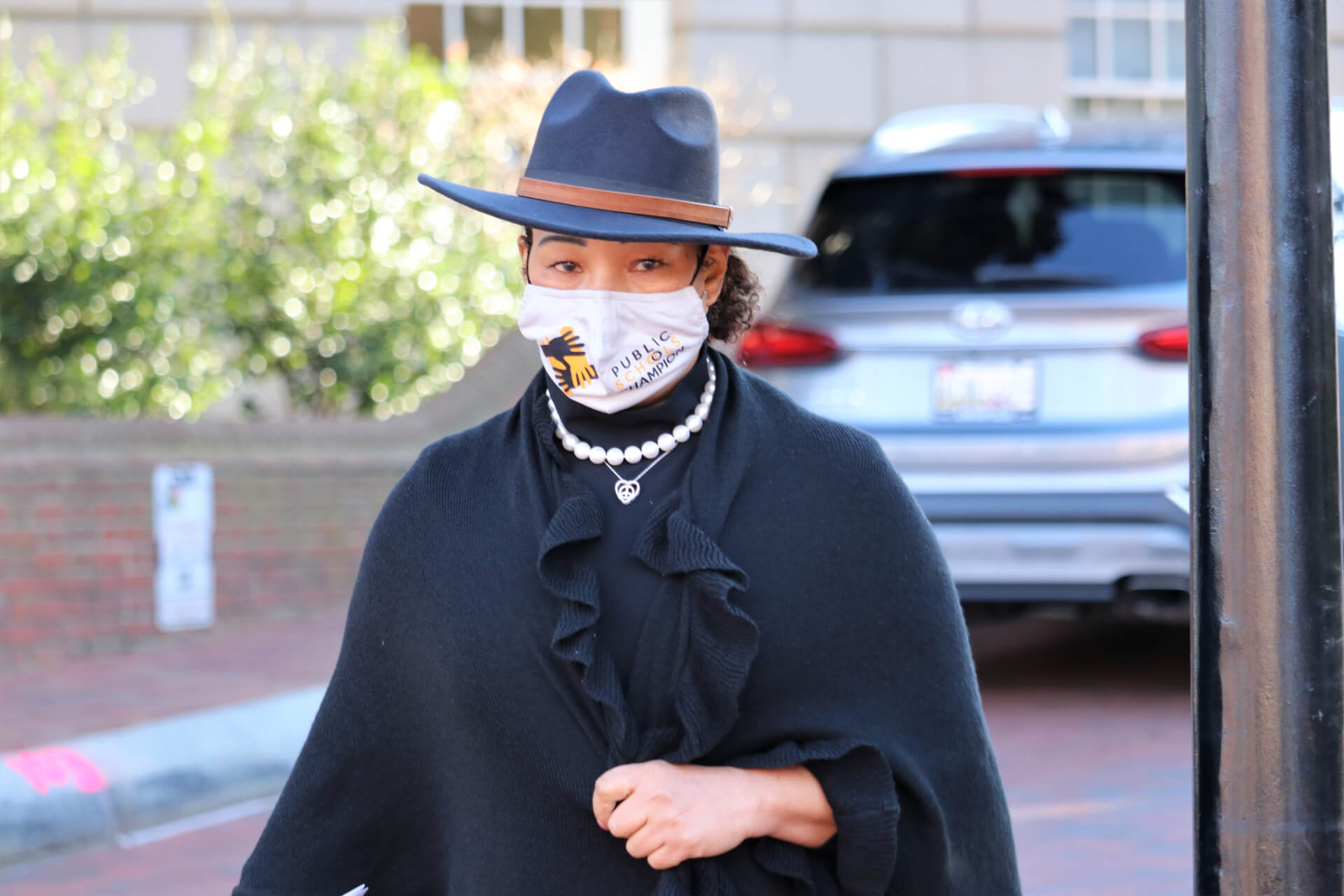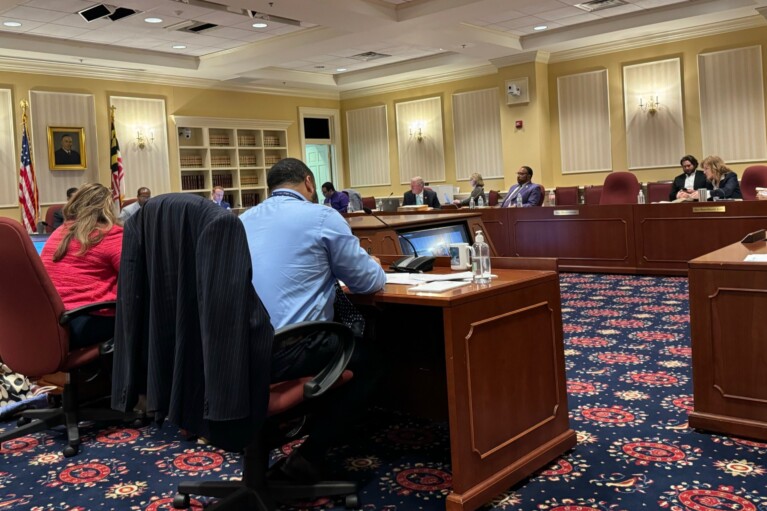
The Senate Judicial Proceedings Committee held its first of three work sessions to address its more controversial police reform bills Friday.
The topic: whether or not certain misconduct investigation records should be available for inspection under the Public Information Act.
“I think that we really have to take seriously the fact that we have case after case, constituent after constituent, all across the state … that have been victims of not only abuse, brutality by some law enforcement officers ― but that the agency themselves that would not disclose the investigatory file or whether there was even any discipline rendered; that that has been a roadblock to people feeling that they can trust the police agencies to adequately investigate and implement discipline,” said Sen. Jill P. Carter (D-Baltimore City).
Carter is the Senate sponsor of SB178, which seeks to make officer misconduct records, including internal affairs investigatory records, hearing records and disciplinary decision records disclosable to the public under certain circumstances.
Under current law, these documents are considered personnel records, which are mandatorily denied when requested for inspection. Under Carter’s bill, they would be discretionarily denied.
The bill’s language excludes these records from being disclosed if they interfere with law enforcement proceedings, interfere with someone’s right to a fair trial, inappropriately violate someone’s privacy, disclosed the identity of a confidential source, influence an investigation or put an individual in harm’s way.
Carter presented this legislation before the Judicial Proceedings Committee last week. The House version, sponsored by Del. Gabriel Acevero (D-Montgomery) will be heard in the House Judiciary Committee on Feb. 9.
Republicans on the Senate committee worry that making disciplinary records publicly available could destroy not just an officer’s career, but their private life, as well.
Sen. Robert G. Cassilly (R-Harford) said his concern is that certain policing measures will set the tone that “good people don’t want to be cops.”
He told Carter that he’s worried that officer investigations stemming from conduct outside of work, such as “bar scuffles,” minor traffic violations, alleged domestic disputes and even tardiness, could ruin their personal lives.
“All these are all things you’d never see for non-cops,” he argued. “If you went into my personnel file if I worked anywhere but for a police department, all you’re gonna see is what I did as an employee during my work hours.”
Cassilly also brought up what he called the committee’s willingness to quickly protect other groups, like violent juvenile defenders and notaries.
“But suddenly it’s a cop? Make ‘em strip naked and parade down Main Street every day,” he said. “I just don’t get this attitude.”
Sen. Christopher R. West (R-Baltimore County) asked who Carter she intends for these records to be available to under this legislation.
Carter responded that victims and their families are the “primary group of people” that this bill “is designed to help.”
West pushed back, asking why she didn’t explicitly state in the bill that people who are directly involved in criminal complaints should be the ones to access and review ― but not copy and distribute ― these records.
Carter said that the conversation surrounding who should have access to officer misconduct files often “tends to ignore that we have a real problem in Maryland,” noting that data shows that concealing these records contributes to the distrust between law enforcement and the communities they serve.
”But it has also … contributed to a large scale distrust because the truth is, the agencies that have refused to disclose this information have failed, in large part, to ensure that those bad officers ― the few bad apples that we always hear about ― are actually weeded out,” she said.
Carter added that data also shows that officers with multiple complaints only represent small percentages of police forces.
“I bring that up only to say that, for the most part, all of those great officers with a lot of integrity really don’t have anything to be concerned about,” Carter explained. “In addition to that, these are public servants. We are discussing this as if these are not people that are public servants that have an oath, that are obligated to serve and protect the public, and the real problem that we’re kind of ignoring in this conversation is that that has gone largely awry in the state of Maryland.”
“This is one tool in the toolbox; this is one step ― one step of many ― that would help through transparency … bring us to greater accountability,” she said.
‘Utterly irrelevant’
Police officials have wrestled with this bill.
Representatives from the Maryland Chiefs and Sheriffs Association offered a compromise that certain sustained investigatory records could be disclosed.
Riverdale Park Police Chief David Morris said that chiefs and sheriffs looked at sustained complaints specifically related to sexual assault, dishonesty, perjury, false statements and discriminatory practices ― “those most egregious types of cases” ― as matters of public concern.
Morris likened sustained complaints to probable cause records in criminal cases which are published on Maryland Case Search.
Frank D. Boston III, who appeared on behalf of the Fraternal Order of Police, said that sustained simply means “enough to go forward” with administrative hearings.
“It doesn’t mean a guilty finding or anything like that,” he said.
Baltimore County State’s Attorney Scott Shellenberger (D) expressed concern about the ability of defense attorneys to access these records in an attempt to impeach an officer’s credibility as a witness, especially if there are unsustained complaints on their record.
“I’m not only concerned that they would go after them, but I am actually concerned that someone from behind the scenes could manipulate the situation,” said Shellenberger, suggesting that a defendant could call on someone else to make a separate complaint against the officer in question to weaken their credibility as a witness.
Shellenberger said misconduct complaints can take up to a year from the time they were made until they are sustained or unsustained.
“[Senate Bill] 178 as it’s currently drafted would make that file available, not only to defense counsel for a PIA request, but [it] also would be available to the public, which then could ask for it and forward it to the press, and the next thing you know, you’re getting cross-examined about a mere allegation and a jury might have already read about a mere allegation,” he explained.
Carter responded that, when this has come up in her law practice, the state’s attorney has reached out to tell her there’s an issue that needs to be reviewed. Once it’s been reviewed, both sides get a chance to argue in front of a judge whether or not it’s admissible.
David Rocah, a senior staff attorney for the ACLU of Maryland, said that this discussion surrounding impeaching witnesses “is utterly irrelevant to the discussion of the MPIA.”
“And now suddenly we’re talking as if the only context of disclosure is how we’re going to impeach a witness?” Rocah asked. “There’s already a process for impeaching witnesses, and the discussion of the MPIA has nothing to do with it.”
He also addressed Shellenberger’s concern that “someone from behind the scenes” could file a complaint against an officer witness, saying that that, “again, is utterly divorced from the way things work in court.”
“But it’s not the courtroom I’m worried about, it’s Channel 2 news!” Shellenberger exclaimed.
Rocah responded that the Public Information Act isn’t relevant to someone’s disclosure to the media, because if he wanted to “accuse an officer on Channel 2 news, I can do that whether I file the complaint or not.”
“There’s a big difference between standing on a corner saying ‘this happened to me’ and saying ‘oh, they’ve opened a file about my allegations, it’s in the police department,” Shellenberger explained. “Huge difference in credibility. Huge.”
“But I can say that, again, right now,” Rocah argued. “I can say I filed a complaint and they’ve opened the file.”
At this point, the two attorneys began to speak over each other. Rocah’s voice grew louder.
“All these hypotheticals about all these terrible things that will occur, neither Scott, nor the chiefs and sheriffs, nor the FOP, nor anyone else can point to a single instance of any of this occurring in any of the multiple jurisdictions where these records are not shielded from disclosure,” Rocah said. “It’s just a fantasy.”
Shellenberger said that he isn’t the “most inventive person,” but when people are facing long prison sentences “they can get very creative and very inventive.”
“What I’m saying is, nowhere else that I know of can a mere allegation cause somebody to open a file and cause somebody to get a PIA request, and then next thing you know it’s all over the news,” he retorted. “I would remind this legislature that if somebody makes an allegation against one of you, it goes a pretty far way before it becomes public in any way.”




 Creative Commons Attribution
Creative Commons Attribution